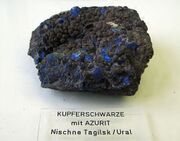Difference between revisions of "Tenorite"
Jump to navigation
Jump to search

| Line 36: | Line 36: | ||
* D.A.Scott, ''Copper and Bronze in Art: Corrosion, Colorants and Conservation'', Getty Publications, Los Angeles, 2002. | * D.A.Scott, ''Copper and Bronze in Art: Corrosion, Colorants and Conservation'', Getty Publications, Los Angeles, 2002. | ||
| + | |||
| + | * Wikipedia: [https://en.wikipedia.org/wiki/Tenorite Tenorite] Accessed Dec 2022 | ||
| + | |||
| + | * Webmineral: [https://www.webmineral.com/data/Tenorite.shtml Tenorite] Accessed Dec 2022 | ||
[[Category:Materials database]] | [[Category:Materials database]] | ||
Revision as of 10:30, 8 December 2022

Tenorite on azurite; Image credit: Ra'ike Wikipedia
Description
A dark gray copper oxide mineral with a metallic luster. Tenorite was named for G. Tenor, in Naples about 1860. While it can occur as an ore, tenorite has also been found as an alteration product of Cuprite forming a thin dark layer over the red. The presence of tenorite as a patina may indicate the object was heated before or during burial (Scott 1997). In a basic environment of a burial site, tenorite has also been found as an alteration product of Azurite (Gutscher et al 1989).
Synonyms and Related Terms
copper (II) oxide; cupric oxide; melaconite; tenorita (Esp.); Tenorit (Deut.); tenoriet (Ned.)
Physical and Chemical Properties
- Monoclinic crystal system.
- Luster is metallic.
- Insoluble in water
| Composition | CuO |
|---|---|
| Mohs Hardness | 3.5 |
| Melting Point | 1065 C |
| Density | 5.8-6.4 g/ml |
Resources and Citations
- D.Scott, "Copper Compounds in Metals and Colorants: Oxides and Hydroxides" Studies in Conservation, 42:93-100, 1997.
- D.Gutscher, B.Muhlethaler, A.Portmann, A.Reller, "Conversion of Azurite into Tenorite" Studies in Conservation, 34:117-122, 1989.
- D.A.Scott, Copper and Bronze in Art: Corrosion, Colorants and Conservation, Getty Publications, Los Angeles, 2002.
- Wikipedia: Tenorite Accessed Dec 2022
- Webmineral: Tenorite Accessed Dec 2022